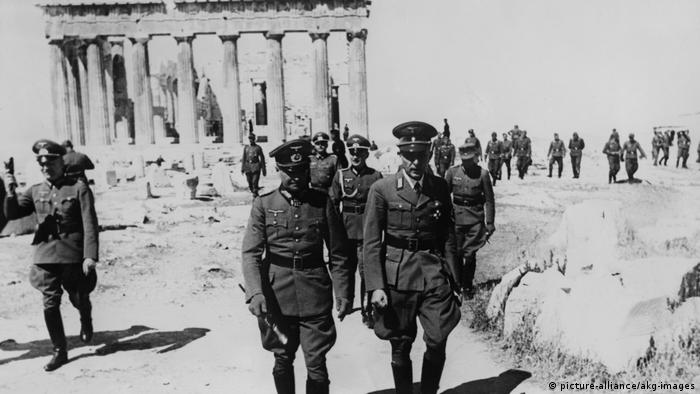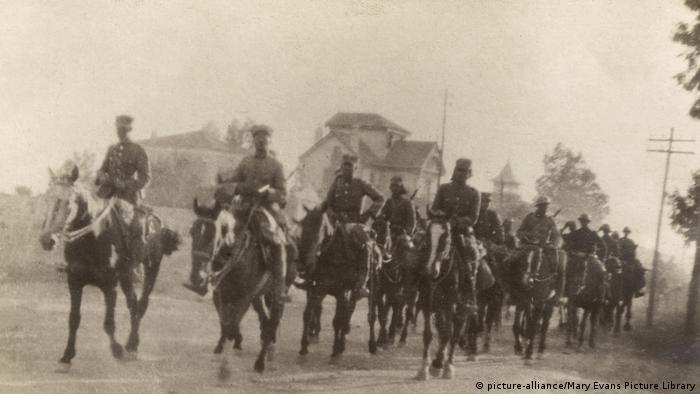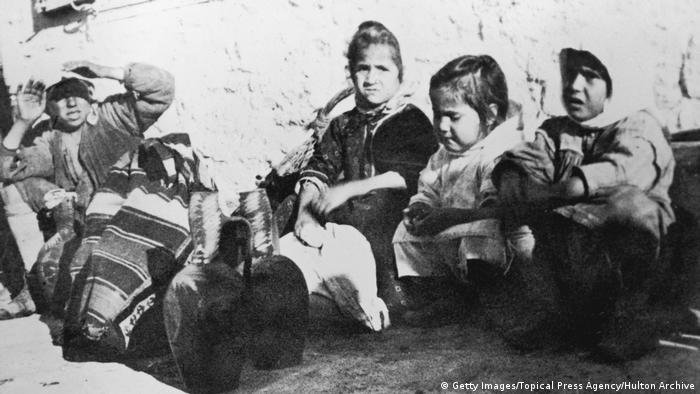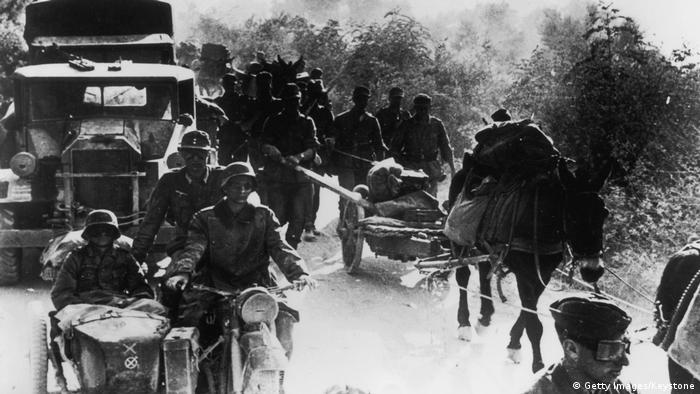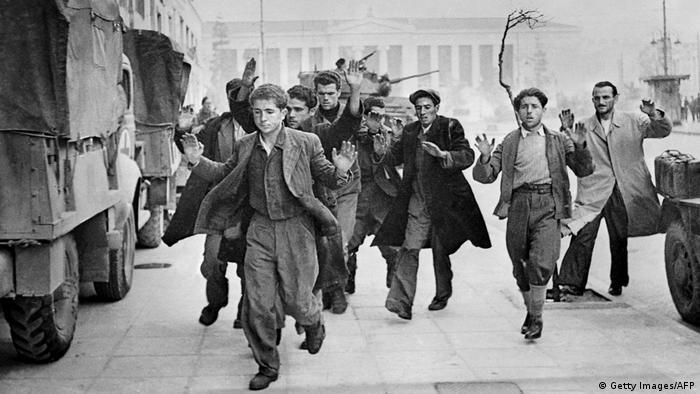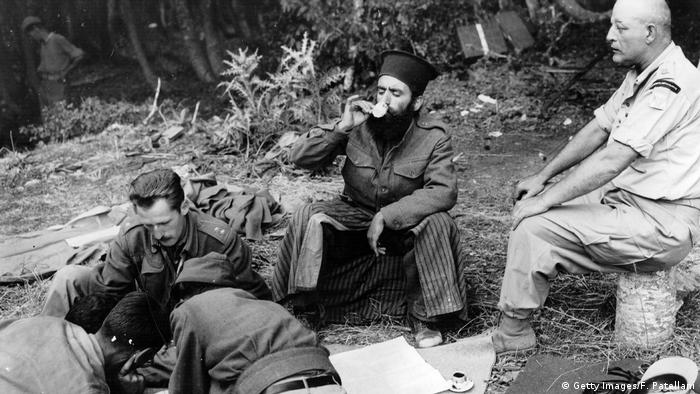Many Greeks collaborated in the Second world war, the German occupying power. It was weigh in Greece. That is changing, says expert Historian, Stratos Dordanas of the DW.
Prior to 74 years of age, at 12. October 1944, the German Wehrmacht from Athens. From 1941 to 1944, the Wehrmacht Greece had occupied. Not all Greeks have condemned the military action of Nazi Germany. Many Greek men worked together – also for political reasons – with the occupiers.
The investigation of the collaboration phenomenon in Greece – as in other European countries – for decades a “taboo subject”; Stratos Dordanas, assistant Professor of modern European and Balkan history at the University of Macedonia in the DW represents the Interview.
DW: Professor Dordanas, what are the consequences of the Second world war for Greece?
Prof. Dordanas: In the last years, important scientific studies have contributed to the sober interpretation of the events have been published. Nevertheless, the question of whether the Greek society is now in a position to consider this unpleasant aspect of your story emotionless at all, in the attempt to accept him and to learn from the history.
How important is the role of the resistance in Greece was?
Very important. The ELAS (Greek people’s liberation army) was the most important Greek guerrilla organisation, the direct influence of the Communist party (KKE). From the beginning, the axis saw themselves powers, and above all the German troops with one of the most difficult problems to be solved of the Second world war, confronted, namely, the partisans of the war.

Prof. Stratos Dordanas
In the immediate context, but also with the question, what is your attitude towards the civilian population in the occupied territories should take. In this framework, the primary objective was the suffocation of the resistance at the Front in Germany, before this assume larger proportions and to develop an uncontrollable threat.
How was organized this resistance?
The partisans used the villages as a base for their supplies, camouflage for ambushes, as an escape route, as a source of information and the recruitment of men, leaders, and Messengers. The occupation forces tried to cut this bond between the partisans and the civilian population in a drastic way. The expansion of the resistance front, made in the years 1943 and 1944, the country as a whole to the field of military operations. The clear line, the difference is the Armed civilian population, was almost blurred beyond recognition. Every civilian was applied was a potential enemy, and the principle of collective liability.
How was widespread collaboration with the Nazis and how, exactly, the Greeks have collaborated?
Today, we are quite sure that many Greeks collaborated during the war with the German Wehrmacht and the SS. To have been members of the security battalions-Greek men from very different motives. For some of them the handle to the arms, respectively, the Takeover of the national socialist ideology – a new adventure meant.

Xenofon Josmas, 1947 sentenced as a collaborator to death, in 1952, released
Associated with this were: the capture of public Offices and Ministerial posts, the Chance of the distribution of the spoils of war, and of the Jewish assets to benefit or to get unexpectedly a chance of Survival under the difficult conditions of the occupation. For others, collaboration was the only way, your life to protect your family and their villages from the attacks of ELAS.
There’s a common denominator?
The common denominator of all these different starting points for the collaboration of anti-communism. The featured the military, the ideologues of national socialism and the actions of its followers. During the period of anti-communism a significant part of the Greek population through intensive Slawophobie – and, in particular, holidays phobia was reinforced. This led to an even larger number of Greeks Patriotic reflexes compared to the existing danger of a separation of Macedonia in favour of Germany’s ally, Bulgaria was triggered.
How large is the number of those who supported the Germans?

Collaborator Ioannis Voulpiotis was charged two Times and two Times (1947/1948) acquitted
A total of over 20,000 Armed belonged to different battalions. They were the most feared opponent of the ELAS and sub – leader were available to the command of the “Higher SS-and Police in Greece,” the Lieutenant General of the Waffen-SS Walter Schimana.
What happened to the collaborators after the end of the war – have processes in place?
In the post-war period, especially from 1945-1950, were all members of the security battalions and the ideologues of national socialism, which had survived to stand trial. Soon, however, it became clear that the Greek government really had the intention to punish the collaborators. Even in the cases that ended up before the special court, were the penalties imposed on how hard they were, after a short time, by Royal edicts, and the pardon Committee.
The prison gates were opened from the beginning of the 1950s. The earlier Greek followers of the Nazi ideology, were integrated in the anti-Communist state, if they had not achieved earlier through the ranks of the “National army” and through their participation in the civil war (1946-49).
This is a typical Greek phenomenon?
In comparison to other European countries, in Greece, is the question of the punishment of the collaborators are no exception. The armed co-operation with the German occupying power was a Europe-wide phenomenon, the wanted to paint the companies immediately after the end of the war very quickly from your memory, because they wanted to put their democratic and, in the meantime, peaceful way. The Greek behavior is different in the small number of those who are ultimately convicted – not forgetting that the end of the occupation, a bloody civil followed the war.
It was almost impossible to find for me, as a journalist, the descendants of collaborators, who were to speak on your personal history. Why?
The investigation of the collaboration phenomenon in Greece, as in other European countries, for decades a “taboo topic” that led the Greek history writing to subjective conclusions and professional historians as a deterrent worked.
The ideological polarization from the civil war time to the systematic and scientific study of this topic. For his investigation of the passage was, first of all, rich in a reasonable period of time is required, since the collaboration during the German occupation, had threatened the national cohesion of the local population.
In addition, many Greeks, who had pressed for collaborating with the enemy and “treacherous” were, even during the civil war in the state apparatus. Even today, this theme evokes vibrant debates and conflicts, while the myth of a unified national resistance – instead of polarizing past, has politically and culturally.
What is the current state of historical reappraisal in Greece?
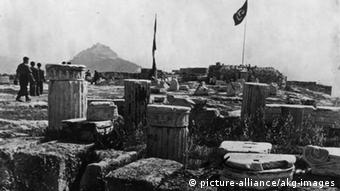
Signs of the German occupation: The swastika on the Acropolis
In the past 15 years, in Greece, in academic and in public debate about the 1940s had a Lot of questions, which were until then considered taboo, came to the surface and were then subjected to a scientific and factual observation. This was often done under difficult conditions, and the debate was not without Controversy, and tensions.
In any case, the lively interest that contributed to the Second world war, both the German occupation and the subsequent civil war were included in the study programs of several universities. Many international meetings were held and a variety of scientific studies about this created. New questions gained currency, old issues were explored in the light of access to sequestered archives. This newly awakened interest extended to the field of Public History, that is, outside of the academic environment.
The Interview was conducted by Maria Rigoutsou.


